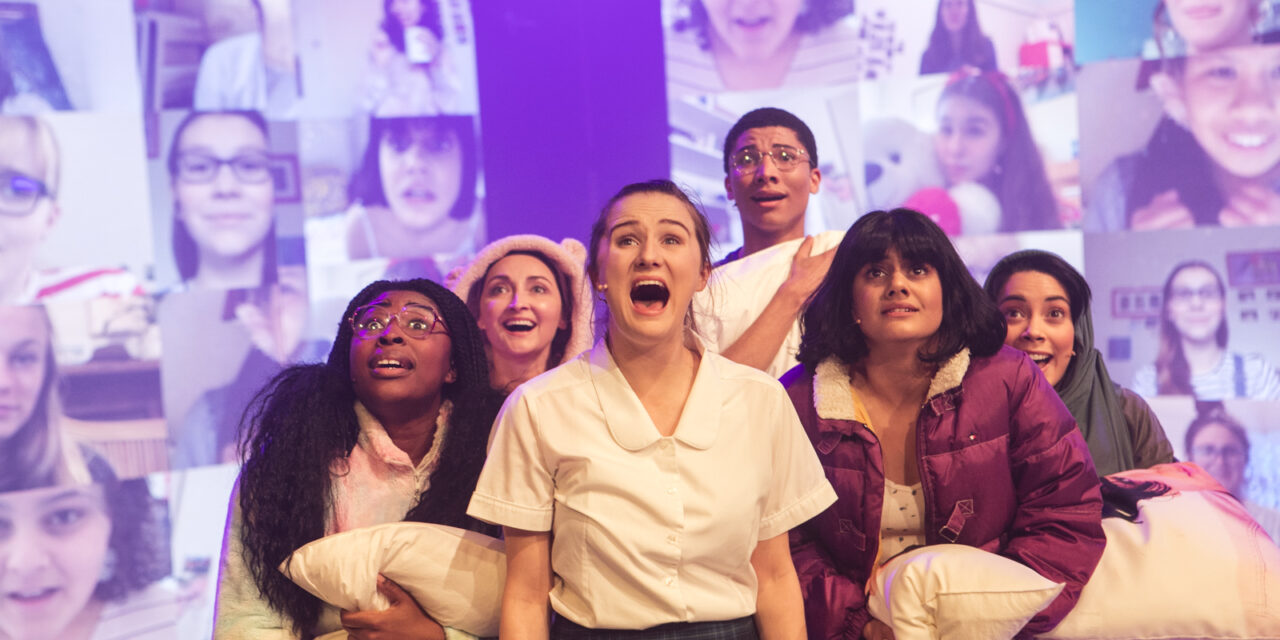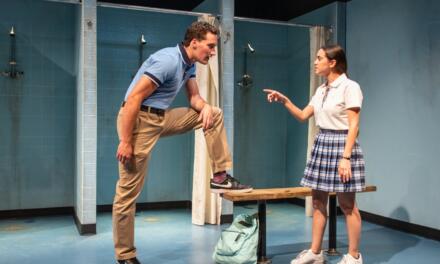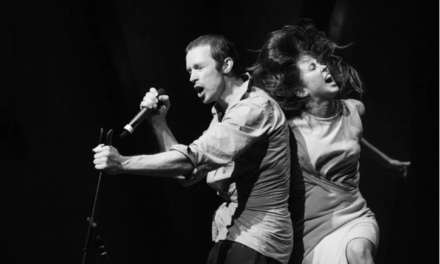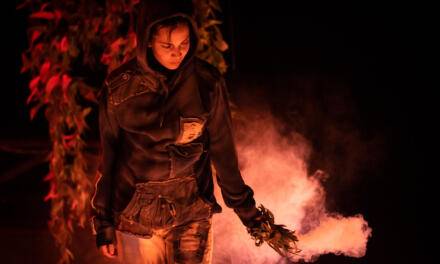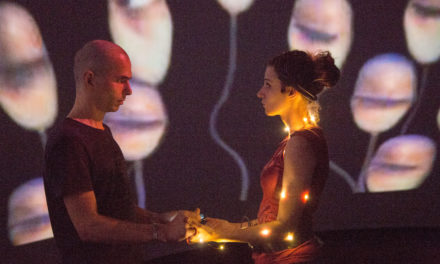From Beatlemania in the sixties to 2010 boy band sensation One Direction, to today’s global phenomenon of K-Pop stars, different generations’ fangirls share an obsession, devotion, and unconditional love. Inspired by teenage girls’ fandom and intrigued by the stereotypical and sexist derision of young women’s passion, Yve Blake created the hit musical Fangirls.
After a sold-out run at the Seymour Centre, which closed the curtain on 20 February, the multi-award-winning smash musical Fangirls is going on a national tour to Adelaide, Wollongong, Canberra, and Melbourne. Leading up to the tour, I had the privilege to interview Yve. I asked her about her inspiration, creative process, and her evolving roles in the production.
The following is an edited and condensed version of our conversation.
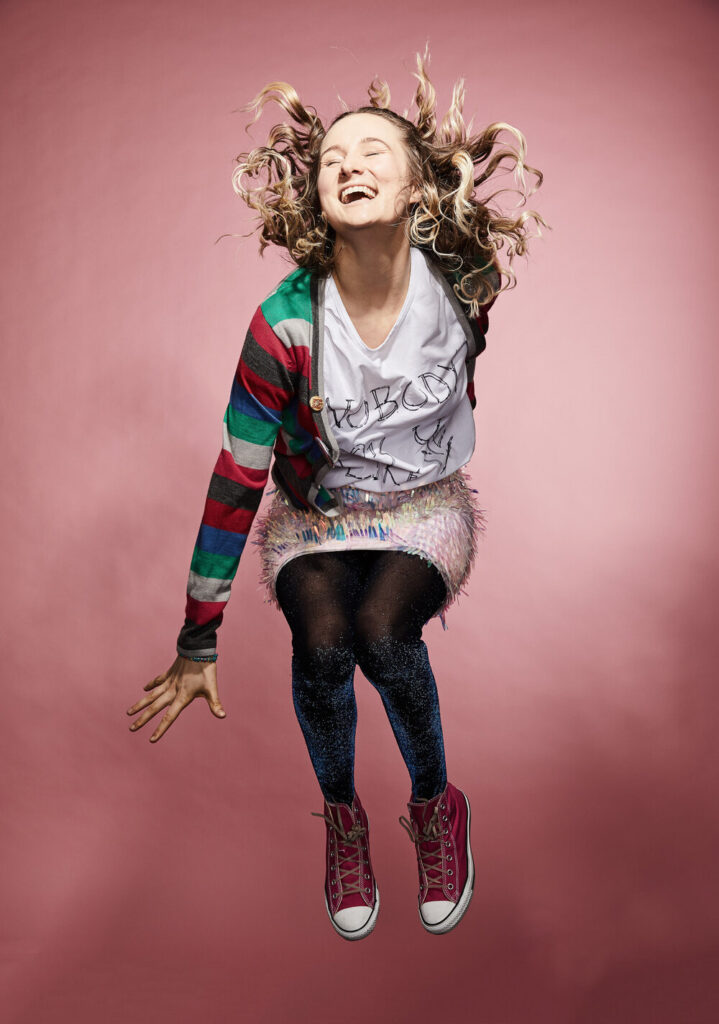
Yve Blake, Photography by Daniel Boud
SL: I watched your TED talk “For the Love of Fangirls” back in 2019. Do you know that the video has reached over 1.3 million viewers now?
YB: I do! Absolutely surreal. It’s really exciting.
SL: In the TED talk, you spoke about how your obsession with Fangirls began. Can you tell us what inspired you to write a show about fangirls?
YB: I never get sick of telling this story. About five years ago, I met a 13-year-old girl who told me she’d met the man who she was going to marry. And I thought, “Oh, wow, that’s very organized.” I asked, “So, what’s his name?” She told me his name was Harry Styles, who at the time was in the world’s biggest boy band. Then she said, “Don’t laugh at me, I’m serious. I love him so much. I want to be with him.” After that conversation, I became obsessed with researching Fangirls. It started as morbid curiosity. The more I researched, I discovered something more interesting to talk about: how we use language to describe young women being excited about things versus young men.
I observed that we quickly use ‘hysterical’, ‘crazy’, ‘scary’, ‘over the top’ and ‘hormonal’ to describe young women having an ecstatic time at a pop concert. However, if it’s a group of young men at a football game displaying similar behaviors, crying and screaming, we would use positive language like “passionate,” “loyal” and call it “the love for the game”. When I discovered that, I realized that I wanted to write a show that felt like a pop concert but was indeed about how we raise young women and young men differently and give them different words to describe themselves.
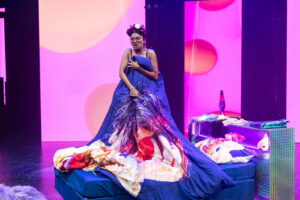
Photography by Brett Boardman
SL: If you were to give Fangirl an alternative definition in Eve Blake’s dictionary, what would you give?
YB: I like that question. Fangirl is a noun but also a verb. There’s something inherently pejorative about the word because we think if girls like ‘something,’ then it is not worthy. To Fangirl, in my definition, is to love something without apology and to express yourself and your enthusiasm without self-censorship. Living in a patriarchy, we often look at expression as a sign of weakness, and we think of stoicism and hiding our emotions as a strength. On the contrary, I believe having the courage to express oneself is true strength.
SL: I totally agree. We all should channel that Fangirl spirit in our daily life. Audiences who saw the show are amazed by the genuine portrayal of teenage girls and how authentic your depiction was: how they speak and interact with their peers and their parents. How did you conduct your research?
YB: Oh, I have never gotten over being a teenage girl. As a teenage girl, I had the most euphoric friendships and the most fun. At the same time, I was anxious, self-conscious, and insecure. I just remember feeling like I had colossal feelings in my body and a very particular vocabulary to express them. Teenage girls’ excessive use of certain words such as “like” and “literally” is amazing to me as they contain so many feelings. So in terms of research, I read a lot of fan fiction, and I spent a lot of time on Twitter.
Most importantly, I spoke to a lot of super fangirls and mums online and in real life. I asked them, “what is it about being a teenage girl that no one tells you about or isn’t represented anywhere?” One girl’s answer became the lyric in the show: “it feels like I was put in a competition that I never asked to be in.” A great part of this project was just listening to teenage girls share their feelings.
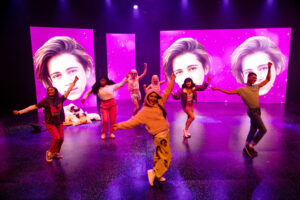
Photography by Brett Boardman
SL: I was amazed by how rich the theatrical vocabulary and the themes are. You’ve got live concerts, multimedia, rap, dance, audience interaction, and more. You explored not only fangirling behaviors but also friendship, all kinds of insecurities running through young people’s lives, parent-children relationships, messages to support LGBT fans. How did you connect all these components and shape this story? Did you have a dramaturg who helped you?
YB: My incredible dramaturg Jonathan Ware and director Paige Rattray deserve a lot of credit. Some of the scene changes are really challenging as I wanted it to feel cinematic – go-between spaces really quickly. Our creative team wanted to make something for the generation who have grown up with the Internet and switch between ideas as quickly as they can open a new tab. That was definitely a goal of ours – to constantly keep the audience surprised and keep the pace rapid.
SL: You called this work a “thriller comedy musical”. I love the analogy you used: this musical is a Trojan Horse that appears to mock the fangirls only to smuggle them into the audience’s heart. What kind of responses did you get from the fangirls themselves and those who might not understand them before they saw the show?
YB: Two of my favorite responses to the show are these: Number one, it’s young women who feel identified. The other kind of interaction that feels special is when a Dad comes up to me and says, “I didn’t want to come and see this. I wasn’t interested, but I loved it. And I’m thinking differently about how I talk to my daughter.” It’s been really fun to get those kinds of meta interactions. Now we have people online creating fan-art and memes about the show. It’s the thrill of my career.
SL: I was surprised to find out that Fangirls is your first musical, and you don’t play any instrument. That is just amazing. How did you compose the score?
YB: I love talking about it. When I was twenty, I wanted to write music, but I thought it wasn’t possible because I struggled to learn an instrument. I felt that it was over for me but it’s not true. I taught myself how to compose music entirely from YouTube. I composed the entire show on my laptop using software that I accessed for free. If anyone feels like they want to write a musical, but they can’t play the piano, it’s not a barrier. I still can’t read music, but that’s not an issue. I have a music director who can translate my digital compositions into sheet music. So, yeah, I made it.
SL: That is such an inspiring story! You were the lead of the original season of Fangirls back in 2019. Are there any significant changes for this run? And how did you work with the team this time?
YB: It’s exhilarating being outside of it. Now I get to be just a writer and find the many small changes I want to make. The show will continue to evolve as it tours.
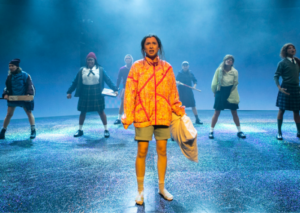
Photography by Brett Boardman
SL: What’s it been like to sit in the audience and watch Karis Oka portray a new Edna? Are there things in her performance that surprise you?
YB: It was so emotional for many reasons. First of all, Karis was such a powerful artist. Also, I felt strongly when I was in the show; I always wanted to write a musical that I wish I had been able to see when I was 14. All the popular musicals I fell in love with as a teenager were probably written by a group of men or centered around a white woman. I felt like being the lead myself was the one compromise I made in the original version, so it feels great to see Karis as the female lead. I am obsessed with the entire cast, and it is a real privilege to have made something utterly uncompromised on stage. These guys have realized my vision more than I could have hoped.
SL: You created many outstanding productions when you were working in London at a young age. How did that experience influence your work now?
YB: When I was 19, I was making really unusual interactive theatre at a fringe level. What that meant is that if you couldn’t afford a costume designer, then you picked up a glue gun and stapled your costumes together. It was very scrappy and wasn’t ever professionally funded. It meant that you kind of made up the rules. With Fangirls, I wanted to break lots of rules. The score is entirely electronic and doesn’t sound like a traditional musical. The team is comprised of a lot of people who’ve never done a musical before, which was really intentional. I’m trying to make something that I haven’t seen. In my early years in London, they taught me resilience, and they taught me not to pay too much attention to how things should be done, to be creative, and to kind of scrap stuff together.

Photography by Brett Boardman
SL: You are now based in Sydney, and you created this successful original Australian Musical at such a young age. It goes to show the importance of empowering young artists. How can the local community support the new generation of performing arts makers?
YB: I think it has been essential to have opportunities to work with professionals at the top of their game. I struggle to answer that because when I think of my career, I’ve often scrapped my way, and I’ve worked outside the system too. I think it’s the responsibility of creators like me who have been given a large-scale opportunity to make themselves available to young creatives. I encourage young people who see the show to reach out to me on Instagram because it doesn’t take me more than a minute to send a voice message back and answer their queries.
SL: My last question, Fangirls is now going on a national tour, and a TV-series adaptation is being developed. What is your biggest dream for what Fangirls can do from here?
YB: The sexy answer would be, “I want to see it on Broadway.” I’d love to see it play overseas, but what I really care about is when a kid sees it and then comes up to me to say, “thank you for putting that thing on stage because I’ve never seen a version of myself.” What matters to me now is making it as accessible as possible so that teenagers who feel like the show’s characters can interact with it. Honestly, for me, the most democratic part of musicals is the cast album. Almost anyone can access it via streaming music. I’m really excited about the release of our album this year. I hope this show will reach people who, for whatever reason, couldn’t come and see the live version. That’s my dream.
ABOUT FANGIRLS
30TH JANUARY – 9TH MAY 2021
SYDNEY & ADELAIDE & WOLLONGONG & CANBERRA & MELBOURNE
Meet Edna. She’s 14, finding her feet, and head over heels in love with the most ridiculously beautiful boy she’s ever seen, Harry. There’s just one problem:
Harry is in ‘True Connection’ – the biggest boyband in the world. But for an industrious scholarship girl like Edna, that’s only a hurdle, because nothing will get in her way of meeting Harry, and proving to him that she, more than anyone else in his legion of screaming fans, understands the real him.
Only she can set him free.
CREATIVE TEAM
Book, Music & Lyrics Yve Blake
Director Paige Rattray
Original Music Director/Vocal Arranger Alice Chance
Music Producer/ Sound Designer David Muratore
Dramaturg Jonathan Ware
Music Director/Vocal Arranger Zara Stanton
Set, Video Content and Costume Designer David Fleischer
Video Content Design and Production Justin Harrison
Lighting Designer Emma Valente
Choreographer Leonard Mickelo
Sound Designer Michael Waters
Associate Director Carissa Licciardello
Associate Choreographer Sharon Millerchip
Lighting Realiser Renae Kenward
With a cast of nine including Aydan, Danielle Barnes, Chika Ikogwe, Shubshri Kandiah, Ayesha Madon, James Majoos, Karis Oka, Tomáš Kantor, Shannen Alyce Quan.
Belvoir co-production with Queensland Theatre & Brisbane Festival, in association with Australian Theatre for Young People
This post was written by the author in their personal capacity.The opinions expressed in this article are the author’s own and do not reflect the view of The Theatre Times, their staff or collaborators.
This post was written by Shiya Lu.
The views expressed here belong to the author and do not necessarily reflect our views and opinions.

